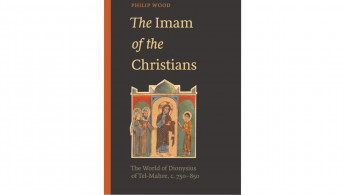The Imam of the Christians: The World of Dionysius of Tel-Mahre
Philip Wood’s The Imam of the Christians: The World of Dionysius of Tel-Mahre, c. 750-850 takes us into the fascinating world of Arab Christian politics during the Abbasid Caliphate with a focus on the life and times of Dionysius of Tel-Mahre, who famously declared himself the Imam or leader of the Christians during the reign of Caliph Al-Ma’mun (813-833 AD).
“For us [Christians] authority comes from choice (gbita) and voluntary consent (salmuta d-sebyana) in choosing a leader, and who hold this [authority] as a priesthood, not as [secular] leadership. This is what you call ‘imamate’. Just as the imam stands first in prayer and exhorts the people [to good deeds], the patriarch and the bishops stand at our head and pray and exhort us to obey the law and impose punishments on those who break it.”
The Imam of the Christians shows how Christians adapted to the shifting politics, but more importantly it does not treat Christians under Muslim governance as passive receipts- they were active agents of governing structures.
This passage is what Dionysius famously told Al-Ma’mun in a negotiation with the Caliph over changing the status of Christians as distinct from Jews and Zoroastrians. But his employment of the word Imam here is interesting on a number of levels, it reveals the extent to which Muslim political thought was being reappropriated by Christians and for Dionysius, it represented his attempt to become the Caliph of the Christians with only Al-Ma’mun and the Abbasid state above him.
The collapse of the Roman and Persian empires through the political world into crisis, as Wood observes, “By the standards of the preindustrial world, the later Roman empire was a highly interventionist state. High levels of taxation were used to pay for a large standing army, which had dramatically increased in size after the invasion of the third century.”
The arrival of the Arabs in the seventh century and the fall of the Roman empire, radically altered the socio-political landscape with the demise of centralising authority, local notables throughout the former empire found they were richer and more powerful within their terrain.
Christian aristocrats suddenly found they could exercise greater influence in their communities, “Arab settlement in the seventh century was mostly restricted to a number of garrison cities (amsar), and the territories beyond these cities were relatively unsupervised by the Muslim state.”
The newfound wealth was used on grand construction projects, such as building big churches throughout the Levant. However, by the time the Abbasids took control of the Near East after 750, these communities found themselves back under a centralising authority and a taxation regime. While this was unpopular with various Christian communities, some sought to take advantage of the new regime.
"A distinct theo-politics emerged where Christians reimagined themselves through the prism of Islam and integrated a number of Muslim concepts into their community"
Dionysius, who hailed from a town near present-day Raqqa in Syria, saw an opportunity with the Caliph Al-Ma’mun. His fluency in Arabic and ability to network politically saw him forging useful friendships including with Abd Allah ibn Tahir, an Abbasid general with close ties to Al-Ma’mun. Al-Ma’mun was unlike previous Abbasid rulers, one particular policy of his would-be instrumental for the rise of Dionysius, according to Wood:
“From a Christian point of view, his most disturbing innovation was to decree that small groups of non-Muslims could secede from their traditional leaders (Christian patriarchs and Jewish exilarchs) without penalty and nominate their own leaders. Until this point the caliphal government had tended to endorse the leadership structures of a small number of Christian confessions, all of whom could trace their histories back to before the Islamic conquests of the seventh century.”
Dionysius would go on to become the Patriarch of Antioch and head of the Syrian Orthodox Church with the support of the caliph. He was able to govern the affairs of Christians from Syria to Egypt with all of the financial benefits it came with.
Philip Wood’s book is part of a growing attempt by scholars to think about the history of Christian-Muslim relations beyond Europe, Christians who lived in Muslim lands distinguished themselves from Christians who lived in the west.
But this distinction went further than one pledging allegiance to the caliphate, a distinct theo-politics emerged where Christians reimagined themselves through the prism of Islam and integrated a number of Muslim concepts into their community.
Dionysius was not only innovating new political structures for Christians in the east, he was also actively involved in the intellectual and philosophical culture in the courts of Baghdad.
While Abbasid governances were communitarian with clear religious distinctions between groups and different laws governing non-Muslims, nonetheless there was integration between communities, The Imam of the Christians shows how Christians adapted to the shifting politics, but more importantly, it does not treat Christians under Muslim governance as passive receipts- they were active agents of governing structures. The book greatly contributes to our understanding of Abbasid era politics and the situation of religious minorities.
Usman Butt is a multimedia television researcher, filmmaker and writer based in London. Usman read International Relations and Arabic Language at the University of Westminster and completed a Master of Arts in Palestine Studies at the University of Exeter.
Follow him on Twitter: @TheUsmanButt


![Minnesota Tim Walz is working to court Muslim voters. [Getty]](/sites/default/files/styles/image_684x385/public/2169747529.jpeg?h=a5f2f23a&itok=b63Wif2V)






